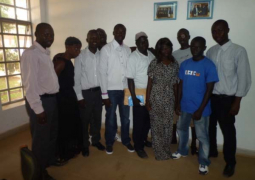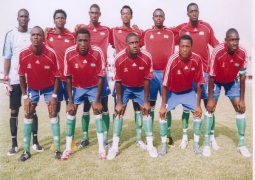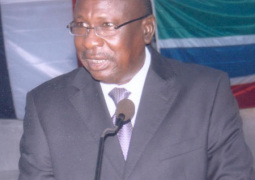
Former UTG director of International Affairs, Alhagie Gumbo Ali Touray, yesterday continued his defence testimony at the Banjul Magistrates’ Court before Principal Magistrate Alagbe Ade Taiwo.
Touray is standing trial charged with the offence of giving false information to a public officer.
Continuing his testimony, Touray told the court that he knew one Mr. Kojo, the Director of Finance at the University of The Gambia, UTG.
Asked by his defence counsel how Kojo was appointed to the UTG, Touray said Kojo started working at the UTG in November 2010, but has received salaries and other allowances even without being fully employed at the UTG.
He added that he was aware that Kojo was fully appointed into the UTG as Director of Finance at UTG only in February 2011, and that his position was once advertised, but it was never re-advertised.
Touray also told the court that Bai Mattar Drammeh interviewed Kojo through a mere telephone interview, and that Kojo was given the highest second salary earned at the UTG.
He added that Kojo drives a government vehicle, and that the UTG took the trouble to enter into a loan agreement amounting to D8 million with interest just to rent accommodation for Kojo at the AU Villa in Brufut in the West Coast Region.
Gumbo said he was able to lay hands on the letter from Bai Mattar Drammeh concerning his telephone interview with Kojo, as well as a letter of the loan transaction between Trust Bank Gambia Limited and the UTG.
He added that the said documents were photocopies, and the original copies were in the custody of the UTG management and he could not lay hands on them.
At that juncture, the prosecuting officer, Superintendent Sainey Joof, raised an objection on the grounds that the said documents were photocopies and the court should not admit them as defence exhibits.
However, the prosecutor’s objection was overruled by the trial magistrate and the documents were declared admissible based on relevance and were admitted in evidence and marked as exhibits.
Touray also told the court that Kojo was not qualified to hold the position of financial director at the UTG, because he was MBA holder with no accounting background, that was why he (Touray) said he was not a qualified candidate for that position.
Touray said one Haruna Jones, a Gambian national, was qualified for the position, but was not offered a similar package like Kojo was offered, which included the fact that Kojo was the second highest earner in the UTG and uses a UTG vehicle without buying fuel.
He said Professor Kah told the court during cross-examination that he recruited Kojo and brought him to the UTG.
Touray said Professor Kah and Kojo attended the same university in America, and that was why the chance was given to him.
Touray went on to say that this was clear evidence that Professor Kah and Kojo were good friends, and that was why a similar opportunity was not given to Haruna Jones who had an ACCA which was purely for accounting, and was deprived the position due to the influence of Professor Kah.
He added that other Gambians applied for the position at the first advertisement, but they did not respond to their applications.
Asked by his counsel Badou S.M. Conteh whether Professor Kah was a qualified professor, according to terms and conditions of the UTG, Touray told the court that Professor Kah was not a qualified professor according to the terms and conditions of the UTG.
He added that as a professor you needed to author at least 12 peer review journals, whereas Professor Kah did not author even a single journal, but instead he co-authored.
He added that according to the documents submitted by the UTG vice chancellor, there were only 8 peer reviewed journals instead of 12 as required according to the UTG conditions of service.
The Vice Chancellor had scored 4 points instead of authored 12 peer review journals, he said, noting that in academia, professorship was significantly based on experience and, in this particular case, there were no books Professor Kah authored.
He said Kah’s professorship was false.
Touray added that he read generally about the requirements of professorship in many universities around the world, including the University of The Gambia, and to him Professor Kah was below qualification after evaluating the fact that he attained his professorship at the American University of Nigeria.
He added that there are no contact numbers or address of the institution or the writer, and this omission was very serious and unusual to be absent from institutional letterheads.
He added that his letter bears no stamp or seal of AN for validation purposes.
Touray added that the letter was not copied to any other official of the university e.g University Registrar, Dean of Faulty, Accountant, etc., and asked how could the salary adjustment, for example, be paid.
He added that the award did not say whether it was the senate, board, council or which authority was conferring the professorship.
Touray pointed out that to attain the rank of professor at any university of reputation, one would have had to establish an international reputation through peer reviewed articles, books and making significant contribution to one’s area of study/ discipline.
He added that the American University of Nigeria (AN) was established around 2006-7 (from google) and not listed in any American university of Washington DC or any other US –based institution of higher learning.
Read Other Articles In Article (Archive)
Education for All Hold Media Training on Sexual Harassment Policy
Jan 6, 2009, 7:37 AM




